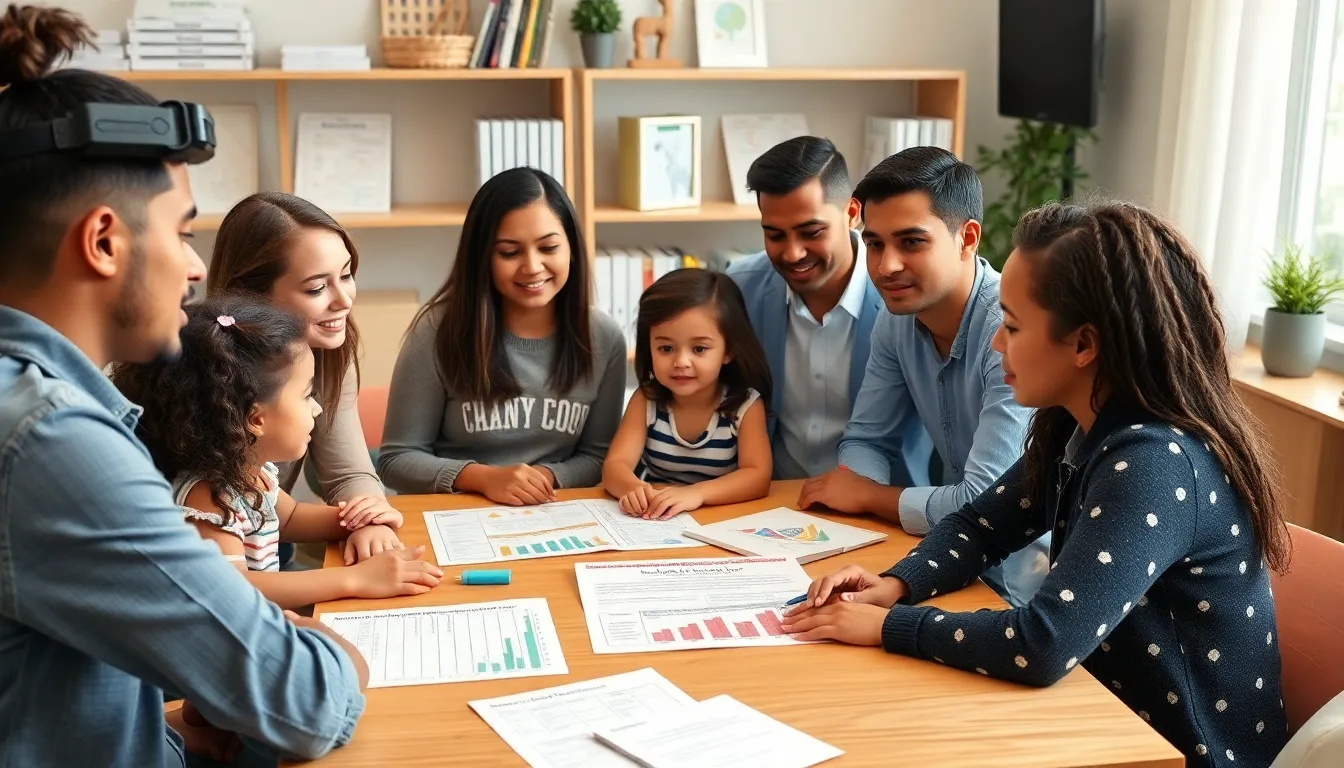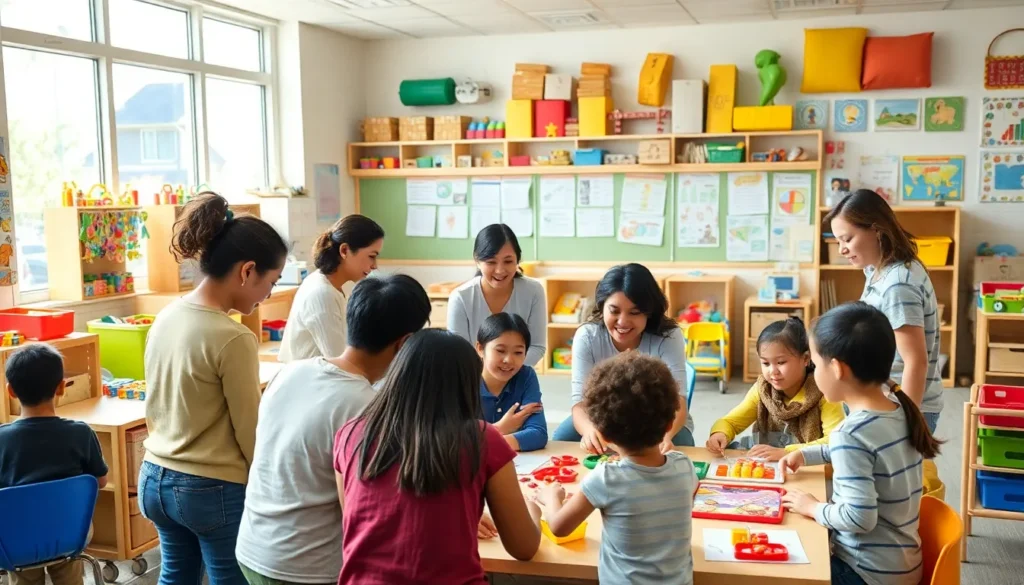Ever wondered what goes on in a child development class? Picture a room filled with colorful toys, enthusiastic instructors, and a sprinkle of chaos as they dive into the fascinating world of growing minds. It’s not just about finger painting and snack time—though those are definitely perks! This class offers a treasure trove of insights into how children think, learn, and interact with their world.
What Is Child Development Class
A child development class focuses on the growth and maturation of children from birth to adolescence. This class examines several developmental domains, including cognitive, social, emotional, and physical growth. Instructors guide students through various activities aimed at fostering an understanding of children’s needs and behaviors.
Students explore topics such as stages of development, attachment theory, and the impact of play on learning. Practical applications play a crucial role, as students engage in hands-on experiences with children. Observation techniques help learners identify developmental milestones in real-time scenarios.
Curriculum often includes child psychology and educational strategies. Interaction with parents and caregivers also features prominently, enabling students to understand the broader context of a child’s life. Field trips to childcare centers enrich students’ experiences, providing on-the-ground views of child development in action.
Discussion formats often encourage collaboration and sharing of insights. Group projects create opportunities to delve deeper into specific developmental theories. Diverse materials, such as books and multimedia resources, facilitate a comprehensive learning experience.
In short, a child development class offers an engaging pathway for understanding how children grow and learn. Combining theory with practice, it equips future educators, caregivers, and child advocates with essential skills and knowledge. Participants gain insights that influence their approach to nurturing children’s development, preparing them for impactful roles in various child-focused environments.
Key Components of Child Development Class

A child development class incorporates various essential components that enrich learning and understanding of child growth. These components form the backbone of effective education in this field.
Curriculum Overview
The curriculum covers developmental stages from birth to adolescence, focusing on cognitive, emotional, and social aspects. Students explore attachment theory and its implications in real-world scenarios. The program includes hands-on activities that encourage the observation of milestone achievements in children. Additionally, coursework integrates child psychology and educational methods tailored for diverse learning environments. Field trips to childcare centers enhance theoretical knowledge with practical observations. Various multimedia resources, such as videos and interactive content, support understanding.
Skills Acquired Through the Class
Students acquire skills crucial for nurturing and assessing child development. Observation techniques enable them to track developmental milestones effectively. Communication skills enhance their ability to interact with children, parents, and caregivers. Understanding of developmental theories fosters critical thinking and practical application in real-life situations. Collaborative group work builds teamwork abilities while discussing concepts and strategies. Integrating research skills helps in staying updated on child development topics. Furthermore, experiences in the field provide invaluable insights that deepen their understanding and preparedness for future roles.
Importance of Child Development Class
Child development classes offer crucial insights into a child’s growth and maturation. They equip individuals with knowledge that benefits educators and parents alike.
Benefits for Educators
Educators gain valuable skills that enhance their teaching practices. Understanding child development stages empowers them to tailor educational strategies to meet individual needs. Observational techniques learned in class help educators assess children’s progress effectively. Networking opportunities with peers foster collaboration, promoting shared learning experiences. Additionally, exposure to diverse resources broadens their perspectives on child development.
Benefits for Parents
Parents benefit significantly from child development classes. These classes provide insights into fostering a supportive environment for children’s growth. Knowledge about developmental milestones enables parents to recognize and celebrate achievements. Effective communication strategies learned in class help parents engage with their children more meaningfully. Furthermore, discussions with instructors offer valuable guidance on managing challenges that arise during different developmental stages.
How to Choose the Right Child Development Class
Choosing the right child development class involves evaluating various important factors to ensure the best fit.
Factors to Consider
Location remains a primary consideration; ease of access can influence attendance. Class size can also impact individual attention; smaller groups often allow for more personalized learning. Another aspect to evaluate is the instructor’s qualifications and experience; educators with a background in child development or education provide deeper insights. Course content should align with specific interests; options may include areas like cognitive development or social-emotional growth. Lastly, the format of the class can matter; in-person classes encourage interaction, while online formats offer flexibility.
Recommended Resources
A variety of resources exist to aid in selecting a suitable class. Websites like the National Association for the Education of Young Children (NAEYC) provide comprehensive guidelines for early childhood education. Local community colleges often offer child development courses; exploring these programs can reveal various formats and options. Additionally, books on child development can deepen understanding of key concepts and approaches. Networking with seasoned educators also offers valuable insight; speaking with those who have attended specific programs can clarify expectations and outcomes.
Conclusion
Child development classes play a crucial role in shaping the understanding of children’s growth and learning. They provide educators and parents with essential tools to support and nurture children’s development effectively. By combining theoretical knowledge with practical experiences, these classes empower individuals to create enriching environments for children.
The insights gained from observing developmental milestones and engaging with diverse resources foster a deeper appreciation for the complexities of child development. As participants learn to navigate the various stages of growth they become better equipped to address the unique challenges that arise during each phase. Overall the benefits of child development classes extend far beyond the classroom enriching the lives of children and those who care for them.

